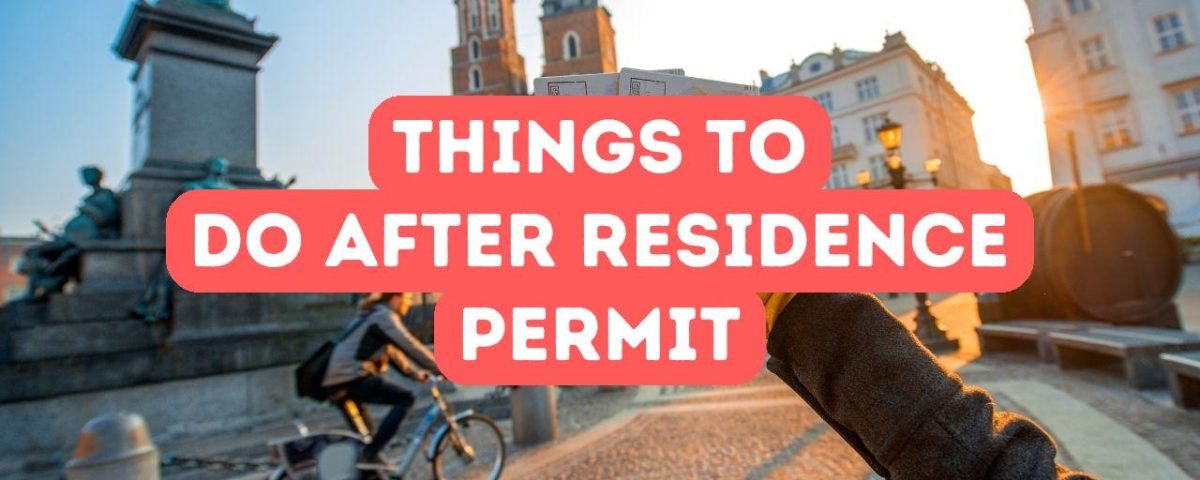What to Do After Getting Residence Permit

Fast-Track Residency Options
March 27, 2024
What to Do When Residence Permit Was Stolen
March 27, 2024Navigating the initial stages of settling in a new country can be both exhilarating and daunting. Once you have successfully obtained a residence permit, your journey to integrating into your new environment truly begins. This permit is more than just a legal document; it is your key to unlocking a life filled with unique opportunities and experiences in your host nation. It is imperative that new residents familiarize themselves with local laws, social norms, and the available resources provided by the community to ensure a smooth transition. Equally important is taking proactive steps towards achieving long-term goals, whether they be educational, professional, or personal. After obtaining your permit, a carefully crafted action plan to secure housing, employment, and a robust social network will pave the way for a fulfilling and stable life in your new home. The residence permit is the foundation on which you will build your future, and what you do after receiving it can significantly impact the success of your integration into a new society.
Securing Your Legal Status: Next Steps
Upon receiving your residence permit, it’s crucial to ascertain that all your legal documentation is in order. Double-check the details on your permit to ensure that your personal information is accurate and report any discrepancies to the relevant authorities immediately. Keep copies of all your documents, including passports, permits, and any legal correspondence. Register with the local municipality and tax authorities if it’s required in your new country, as this is often a prerequisite for accessing healthcare, social services, and educational facilities. Staying vigilant with your legal status not only secures your right to stay but also protects against any potential bureaucratic complications that could arise in the future.
In addition to ensuring that your documents are in order, it’s important to familiarize yourself with the conditions and obligations tied to your residence status. This often includes understanding the requirements for renewing your permit, and staying informed about changes in immigration policies that may affect your right to live, work, or study in the country. Set reminders for permit expiry dates and start the renewal process well in advance, as it can sometimes be lengthy and complex. It’s also prudent to explore options for long-term residency or citizenship, as these may offer more stability and rights. Regular consultations with a legal advisor or an immigration specialist can help you navigate the legal landscape, keeping your residency secure as you build your new life.
With your documentation and compliance in check, the next vital step is building a safety net by familiarizing yourself with local emergency protocols and legal aid services. Many countries offer orientation programs for new residents, covering everything from language courses to legal rights awareness—participation in these can expedite your cultural adaptation and provide essential knowledge for navigating everyday life. Additionally, securing legal insurance might be a wise investment, offering you peace of mind and financial protection against any unforeseen legal challenges. Actively engaging with expatriate communities or local networks can also provide informal support and advice from others who have undergone similar experiences. By taking these proactive measures, you fortify your legal standing and ensure that minor issues do not escalate into threats to your residency.
Integrating into the Local Community
Integrating into the local community is crucial for cultivating a sense of belonging and setting the stage for a successful new chapter in life. After obtaining your residence permit, consider taking language classes if there is a language barrier to overcome. This not only helps in day-to-day communication but also demonstrates your commitment to embracing the local culture. Attend community events, festivals, and workshops to meet new people and build a network of contacts. Volunteering is another excellent way to contribute to community life while gaining a deeper understanding of social dynamics and the needs of the area. Through these interactions, you’ll begin to understand the subtleties of local customs and etiquette, easing your integration and allowing you to feel at home in your new surroundings.
With your language skills developing, it’s time to deepen your engagement within the community. Most neighborhoods have clubs, societies, or groups bound by common interests, be it sports, arts, gardening, or technology. Joining one that resonates with your hobbies can provide a sense of routine and shared purpose, making the assimilation process enjoyable and organic. Furthermore, improve your familiarity with local protocols and current events by staying informed through local news outlets. Consider establishing a relationship with your neighbors, which not only fosters a supportive network but could also lead to lifelong friendships. Remember, the essence of feeling at home is not just about adapting to a place, but also about letting that place adapt to you by bringing your unique contributions and willingness to participate in the ongoing narrative of the community.
Finally, securing your place in the community may weave into the professional realm, particularly if your residency is tied to employment or business opportunities. It’s critical to understand your rights and obligations in the local workforce, including any sector-specific regulations and cultural nuances that inform business conduct. In parallel, attending local business events, joining professional networks, and seeking mentorship can help you navigate industry landscapes and cultivate professional relationships. Balancing cultural sensitivity with assertiveness in your professional dealings will solidify your reputation as a valuable and respectful member of the workforce. As your roots grow deeper, you empower not just yourself but also enrich the community with your perspective and skills, completing the circle of integration with mutual respect and contribution.
Accessing Public Services and Benefits
Upon receiving your residence permit, it’s crucial to register with the local municipality to gain access to a plethora of public services and benefits that will support your new life. This often includes healthcare enrollment, registering for social security benefits, and obtaining tax identification numbers. It is a step that not only familiarizes you with the administrative epicenter of your new community but also ensures your eligibility for fundamental services such as public education for children, waste collection, and emergency services. Early registration often paves the way for smoother interactions with governmental agencies and provides a safety net as you navigate the intricate web of your new societal framework. It’s a proactive move that reinforces your status as a new resident and demonstrates your intent to integrate responsibly into the social and economic fabric of the country.
In addition to basic public services, your residence permit grants you the right to participate in national and local elections, which is a powerful avenue for having your voice heard in your new community. Engaging in the political process not only influences public policy and local development but also fosters a sense of belonging and civic responsibility. Register to vote as soon as you satisfy the residency requirements and seek to understand the political landscape of your host country. Voting is an important facet of integration, allowing you to contribute to the shaping of the society that you are now a part of. It’s equally important to explore the cultural, recreational, and educational programs provided by local libraries, community centers, and cultural institutions. These resources are designed to enrich the lives of residents, and by taking advantage of them, you can rapidly acculturate and connect with individuals who share your interests and passions.
Furthermore, many countries offer language courses and integration programs specifically tailored for newcomers, which are instrumental in overcoming language barriers and understanding societal norms. Engaging in these programs not only equips you with essential communication skills but also demonstrates to potential employers and local citizens your commitment to becoming an active, contributing member of society. It’s crucial that you inquire about such opportunities at local community service offices or immigrant support centers. Participation can dramatically ease the integration process, providing a foundation for building a personal network and navigating the cultural nuances of your new home. Taking full advantage of these services can hasten your adjustment period and lead to a more holistic and enjoyable experience in your adopted country.




